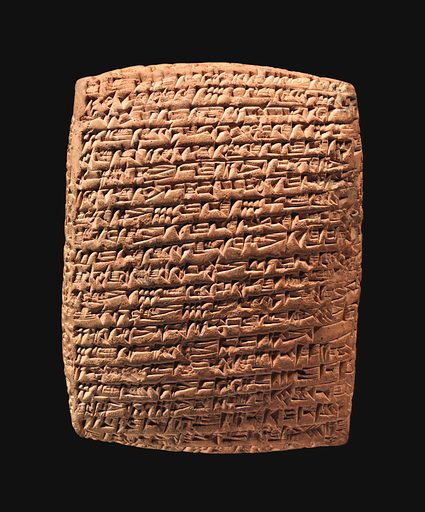
TRANSLATION: “The earth is degenerating today. Bribery and corruption abound. Children no longer obey their parents, every man wants to write a book, and it is evident that the end of the world is fast approaching.”
Noted in Passing: Assyrian Tablet, c. 2800 BC
Next post: Color Me Impressionable
Previous post: Noted in Passing: Flaming Feminism in 2022





![RUSSIA NEEDS WAR FIGURES [Translation: "You got another thing comin' "] by Alexander Dugin liberalismhastaken](https://americandigest.org/wp/wp-content/uploads/2022/07/liberalismhastaken-150x150.jpg)


 Gerard Van der Leun
Gerard Van der Leun
























Comments on this entry are closed.
Such as it ever was, since The Fall, though currently the speed of the decline does seem to have accelerated.
The problem with prophecy, or the reveal, is timing. He was 800 years early for the Bronze Age collapse, which was a doozy. Fer sure I’d take 800 years now for me and mine but my pessimistic side thinks in two digits.
Actually, he was 1600 years too early, as the Bronze Age Collapse occurred between 1200 and 1150 BC.
student named Ashur-neb’s crib brick.
“And when I was your age, you could get a really big one for just a nickel!”
If that writing is indeed Assyrian, it comes from the earliest recognizable evidence of anything truly Assyrian. The written language is probably Akkadian, a form of Cuneiform. Assyria as an independent power, then empire, begins around 2000 BC. The Assyrian Empire (1300 – 612 BC) was the first modern state, the first cosmopolitan state and boasted the first modern military. It was also one of the cruelest nations of all time, sharing that title with the Aztecs (c. 1300 – 1519) and the Japanese (1920s – 1945). Half of the Old Testament concerns the Assyrians and how they treated the Hebrews. The Assyrian kings once controlled half of the world and were hated by every one of their neighbors. The conquered peoples constantly revolted which meant that every year the Assyrian Army would march out and administer astoundingly violent reprisals against the rebels.
The Assyrian kings would write about their conquests and record them for all eternity. Some examples:
“The king trampled on his fallen enemies and hung their corpses on posts…I flayed as many nobles as had rebelled against me and draped their skins over the pile of corpses and upon walls…I burnt their adolescent boys and girls…I captured many troops alive: I cut off of some their arms and hands; I cut off of others their noses, ears, and extremities. I gouged out the eyes of many troops. I made one pile of the living and one of the heads. I hung their heads on trees around the city…I filled the wide plain with the corpses of his warriors. These rebels I impaled on stakes. A pyramid of heads I erected in front of the city…I hung their king up in front of the gate of his city on a stake. Their dismembered bodies I fed to the dogs, swine, wolves…I cut their throats like lambs. I cut off their precious lives as one cuts a string. Like the many waters of a storm, I made their gullets and entrails run down upon the wide earth…The wheels of my chariot were bespattered with blood and filth. With the bodies of their warriors, I filled the plain like grass. Their testicles I cut off, and tore the privates like
the seeds of a cucumber.”
Yet much of what we know about ancient Mesopotamia (4000 – 612 BC) is because of the library of one of Assyria’s greatest—and thus most cruel—kings, Ashurbanipal (r. 669 – 626 BC). Ashurbanipal bragged about his library and about his own education and culture. His library contains 30,000 volumes, including the first copy of “The Epic of Gilgamesh”. Yet this king realized at the end of his life how power is fleeting and how all men must die:
“Why have sickness and misery befallen me?
I cannot do away with strife in my country and in my family.
Illness of body and mind bow me down.
With cries of woe I bring my days to an end.”
Less than 20 years after his death, his mighty empire was destroyed in two weeks (612 BC). Let Nahum, a prophet of the Hebrews, who so often were the victims of Assyrian cruelty, have the last word:
“O King of Assyria, your shepherds slumber;
your nobles lie down to rest.
Your people are scattered on the mountains
with no one to gather them.
Nothing can heal you;
your wound is fatal.
All who hear the news about you
clap their hands at your fall,
for who has not felt
your endless cruelty?”—3:18 – 19
Let us talk about how “children no longer obey their parents…” This is new?
“Injurious Time,
What age escapes thy curse!
Evil our Grandfathers were,
Our fathers, worse.
And we, till now unmatched in ill,
Must leave successors
More corrupted still.”
Horace wrote those words 2000 years ago. Truly “there is nothing new under the sun.”
“The future’s uncertain, and the end is always near.” — J.D. Morrison
If you knew where Hunter Biden’s cylinder seal had been…
Obligatory Peter Pringle Gilgamesh:
Lament For GILGAMESH, The Gold Lyre Of Ur
https://www.youtube.com/watch?v=dDRD3c-WAec
Anyway, things are much worse today:
https://bayourenaissanceman.blogspot.com/2022/11/a-sickening-illustration-of-moral.html
The basically very good but more than slightly keen to remind everyone just how goodie two shoes Mister Grant doubtless will not allow my comment pointing out just how many of the malefactors in his examples entirely randomly happen to belong to the Chosen… but, per usual… in the avant-garde of the tide of degeneracy are to be found the same old same old who are always with us.
Nimrod worship continues to this day.
The original one world empire planner.
True that. Klaus Schwab and Bill Gates and Yuval Harari believe themselves “mighty hunters before the Lord”, the lord of course being themselves. We have seen their kind before. We shall see their kind again.
And you people thought that Jonah was a wimp for not wanting to go preach to the inhabitants of Nineveh. Yeah, that Nineveh, capital of the Assyrian Empire and as correctly described, a scourge of The Levant as well as a whole lot of other folks. Presumably, he had a righteous apprehension of getting his nuts ripped off like… cucumber seeds. And more. Getting eaten by a large aquatic animal probably seemed like a fair exchange.
Astounding that Jonah got the inhabitants of Nineveh to repent and wear sackcloth and ashes. But that was in 2000 BC or so. After the true Assyrian Empire got rolling, repentance was not part of the program. Imagine trying to get Tiglath-Pileser III (r. 745 – 727 BC) to repent. Your skin would be used to decorate a palace wall. Give me 3 days in the belly of a whale anytime.
Akkadian is a language. Cuneiform is a writing system that encodes language, similar to an alphabet or hieroglyph in purpose. Cuneiform was used to encode various languages well into the Iron Age.
No. Akkadian is the earliest version of a Semitic language and used Cuneiform to express itself in writing. Cuneiform is not a language, but a script. It was indeed used well into the Iron Age but only among scholars and priests. By the end of the Iron Age (c. 1200 BC) it was not spoken at all—that is, its spoken form of Akkadian. After the Bronze Age Collapse it disappeared from both speech and writing. Think of Egyptian hieroglyphics: They had disappeared as representing a spoken language as a spoken language around 1000 BC. Thus the Rosetta Stone. It had 3 languages: ancient Egyptian written in hieroglyphics, Greek and Demotic. Had it only shown ancient Egyptian script it could never have been deciphered.
We can read 4500-year-old Cuneiform because we can read and understand ancient Akkadian.
‘We know better than we do.’ Emerson
Seneca (4 BC – 65 AD) would have agreed:
“I see the life I do lead. I know the life I should lead. I follow one behind the other, on all fours, with hands outstretched.”
Reminded me of Wheat Chex
The only real Wheat Chex would be the original Purina, and they’d be about the same age.
Austin, I’ve got you by several years but I would have loved being your student. It’s always a pleasure and learning experience to read your comments.
Thank you kindly. I will leave with some Lord Byron writing about—but of course!—Assyria:
“The Assyrian came down like the wolf on the fold,
And his cohorts were gleaming in purple and gold;
And the sheen of their spears was like stars on the sea,
When the blue wave rolls nightly on deep Galilee.
Like the leaves of the forest when Summer is green,
That host with their banners at sunset were seen:
Like the leaves of the forest when Autumn hath blown,
That host on the morrow lay withered and strown.
For the Angel of Death spread his wings on the blast,
And breathed in the face of the foe as he passed;
And the eyes of the sleepers waxed deadly and chill,
And their hearts but once heaved, and for ever grew still!”